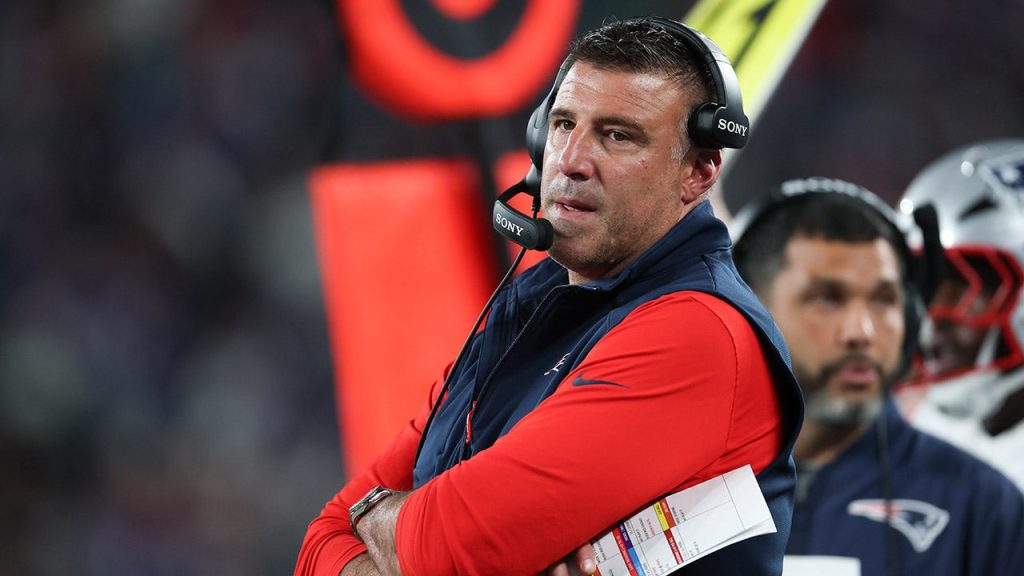Patriots Coach Vrabel Hunting for “Rats” Amid Ja’Lynn Polk Injury Leak
In a tense media session on Thursday, New England Patriots head coach Mike Vrabel expressed frustration over information leaks regarding rookie receiver Ja’Lynn Polk’s injury status. When reporters asked about rumors that Polk would miss the entire season due to a shoulder injury requiring surgery, Vrabel’s response revealed his determination to identify the source of these unauthorized disclosures. “No, other than I’d like to find out where some of these come from,” Vrabel stated firmly. “You know, some of these rats around here. So, we’ll figure that out.” His characterization of the leakers as “rats” highlights the increasing tension between NFL teams trying to maintain competitive information advantages and a media landscape hungry for insider scoops.
The situation began during the Patriots’ preseason opener when Polk, the team’s promising second-round pick from the 2024 draft, sustained what appeared to be a significant shoulder injury. The incident occurred during a routine play when Washington Commanders defensive back Noah Igbinoghene tackled Polk after a short run. Observers noted Polk immediately bracing his right arm as he left the field, and he hasn’t participated in team activities since. This injury represents a significant setback for both the rookie and a Patriots team in rebuilding mode under Vrabel’s new leadership, as Polk was expected to contribute significantly to their receiving corps this season.
What seems to have particularly irritated Vrabel wasn’t just the injury itself but how information about its severity reached the public before the team was prepared to make an official announcement. NFL insider Jordan Schultz had reported on Wednesday that after consulting multiple specialists, Polk would need surgery and was expected to miss the entire 2025 season. Meanwhile, sources who spoke to ESPN offered a slightly more measured assessment, suggesting that the exact length of Polk’s absence would be determined following the surgical procedure. This discrepancy in reporting further highlights the challenging dynamics between teams, players, medical staff, and media when it comes to injury information.
This incident isn’t isolated but rather part of a pattern of Vrabel’s sometimes confrontational relationship with the media since taking over as Patriots head coach. The report referenced that Vrabel had previously clashed with reporters over uncertainty surrounding veteran receiver Stefon Diggs’ availability for the season opener. This leadership style marks a distinct shift from what Patriots fans became accustomed to during the Bill Belichick era, though Belichick himself was also notoriously guarded with injury information. Vrabel’s more direct and emotionally charged approach to addressing leaks demonstrates his commitment to establishing clear boundaries around team information.
The “rat” hunting declaration also provides insight into the culture Vrabel is trying to establish in New England. Coming from the Tennessee Titans, where he built a reputation as a players’ coach who nonetheless demanded loyalty and discretion, Vrabel appears to be implementing similar expectations with the Patriots. For an organization that long operated under Belichick’s tight-lipped approach to team information, unauthorized leaks likely represent not just a tactical disadvantage but a violation of organizational values. Vrabel’s public statement serves as both an investigation announcement and a warning to those within the organization who might be sharing privileged information.
For the Patriots and Polk, the immediate concern transcends the information leak and centers on the player’s recovery. As a second-round investment, Polk represented part of the future vision for a team in transition. His potential season-long absence creates both immediate roster challenges and developmental setbacks that could impact the team’s rebuilding timeline. While Vrabel focuses on identifying and addressing the source of information leaks, the organization must simultaneously adapt their offensive strategy to account for the loss of a promising young receiver. This dual challenge of managing information security while adjusting to unexpected player unavailability exemplifies the multifaceted difficulties facing NFL coaches in today’s media-saturated environment.


